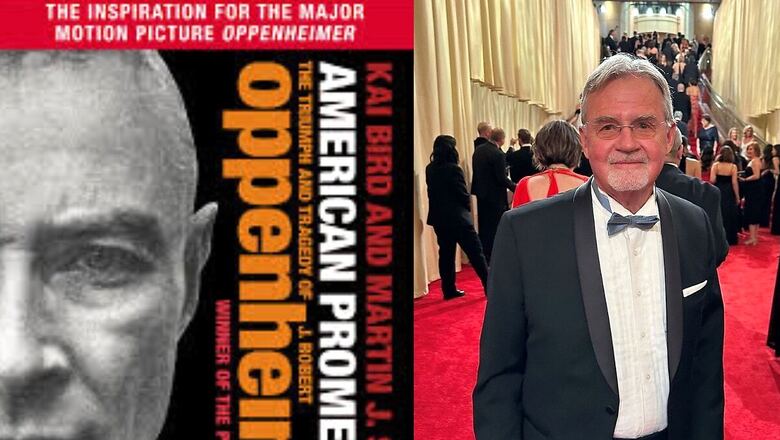
views
Cillian Murphy won the Oscar this year for his amazing portrayal of J. Robert Oppenheimer on screen and alongside him Christopher Nolan too after years of waiting won his first Oscar award for directing the film. Nolan’s ‘Oppenheimer’ was absolutely a cinematic marvel but it is to be noted that the ‘Interstellar’ director referred a lot to a book called ‘American Prometheus: The Triumph and Tragedy of J. Robert Oppenheimer’ while working on what we can now call a remarkable movie. Written by Kai Bird and Martin J. Sherwin, the book is a biography of the theoretical physicist, that later went on to win the Pulitzer Prize.
Kai Bird has worked on many biographies ever since and his works have been celebrated across the globe. In an exclusive conversation with News18 at the Samsung Galaxy Tab S9 Series Jaipur Literature Festival, the biographer spoke about crafting biographies and the very art of it, his works and the very phenomenon called ‘Oppenheimer’ and how he is intrinsically tied to his life.
Excerpts From The Interview-
For a biographer mainly of your calibre, how difficult it is to have an unbiased point of view and how do you not let it affect your work?
Well, I am the first to admit that biography is not objective. You know, it is my story about Oppenheimer, and I bring to it my values, my interests, my curiosity about certain aspects of his life. And, you know, biography is a wonderful medium. It is the best vehicle to convey history, I think because it focuses on one person’s life, and so there is a natural chronology that is built into the storytelling.
And along the way, you learn a lot of history. You learn a lot about the human condition and the events that happened to this person. But it’s my choice, and I can’t possibly, you know, do a life story that includes everything. So I have to make decisions about what to leave in the book and what to take out. And so it’s very subjective. But, you know, while we try to write well, like we try to write in a manner that a novel would, like a novelist, we have to have footnotes. For every quotation and every fact, there should be a footnote.
How do you approach balancing the historical accuracy of a particular subject with narrative storytelling in a biography?
Yeah, well, when we were writing American Prometheus, you know, it’s basically chronological. But we begin the book out of chronology. We begin the book with actually what was happening to him in 1954. And we choose a dramatic story where he faints in the bathroom. And we did that because, you know, that makes the reader curious about how this happened and what happens next. And so Marty, for instance, was always concerned in the writing that the beginning of every chapter and the end of every chapter should have something colourful, dramatic, anecdote, or a quote that makes the reader curious about what happens next. So that’s the storytelling. But, of course, you need to make good decisions about balance.
You know, we wanted to tell, we thought it was important to tell the story of not only the building of the atomic bomb but what happens to Oppenheimer, the man, personally, after he is humiliated and destroyed nine years after being celebrated. And that arc of the story, you know, is very dramatic in his triumph and the tragedy of his life.
Every once in a while, we have a particular, and it’s not just writers, but as any professional, we have that one particular work that surpasses every other work that we do. How do you deal with that? Like, maybe today your name is synonymous with the ‘American Prometheus’ and you are looked at as the man that, okay, Oppenheimer’s story, the film, was based on the writing that you did. Do you sometimes feel that your other works too should be celebrated equally?
That is brilliant and it really makes you think, doesn’t it? Well, yes. I wouldn’t mind if a film was made about my other books, but, you know, it’s a miracle that this film was made on Oppenheimer. It was very difficult. There were three previous attempts to do it, three different scripts by different parties who picked up the film option, and they all failed. They couldn’t persuade Hollywood to do it. And so this underscores what an enormous achievement Nolan has made by succeeding in making an artistically beautiful, compelling, inventive story based on this book and doing so with real detail and attention to accuracy, and historical accuracy. One of my previous books is called The Good Spot and has been under film option since 2014 and years now, and nothing has happened. There’s been a screenplay written for it, but they haven’t been able to take it to the next step. But I have hopes, maybe.
View this post on Instagram
But you were just mentioning that you know, it’s a surprise that a film was made out of the book. Also, in a previous interview, you mentioned that when you were writing the book, you did mention to Martin J. Sherwin that, you know, this book is going to win the Pulitzer. So, even though it has been a while, how was the feeling when it actually happened, when you won the Pulitzer?
Marty was very sceptical when I told him that I thought we might be a candidate for winning the Pulitzer because we’d gotten terrific reviews for a year, but he was very sceptical, rightly so. There are many very good books and other biographies that were published that year. So, yeah, it was terrific when you get a phone call at 3 p.m. on the day of the announcement, and it’s at a press conference, and your editor usually calls you. So I turned around, and I called my wife, who was at work, and she didn’t believe me. She thought I was making a joke. So she hung up, and she went and looked on the Internet to see if it was really true. But, yeah, sure, it was terrific. It was important. The Pulitzer Prize in America is the only prize, actually, that results in so much new publicity that people go and buy the book. So book sales rise. That’s what every author wants, is readers.
Documenting somebody as multifaceted as Oppenheimer, the process must have been very difficult. Did any of his life choices or any of the decisions that he took impact you while you were writing about him? Did it sort of make you think or contemplate?
Well, you know, his story is so relevant to our times. You know, he gave us the atomic era, which we will always be living in, and it’s a very dangerous one. And, you know, when I was growing up, I can remember being like 8 years old, living in Washington, D.C., going to school, and they would have nuclear bomb alerts. As an 8-year-old, I was told in the classroom, oh, we are having a nuclear alert and to hide under our desks to protect ourselves from the bomb. It was insane. It was ridiculous.
So I’m sure this is one of the reasons that I was curious about Oppenheimer’s story and why it’s so important. And, you know, it’s also an important story to explain American politics today. What happened to him in 1954 made him the sort of chief celebrity victim of these McCarthy witch hunts in the 50s, and they’ve corrupted our politics. We are still living with this, the remnants of McCarthyism, which is, at its root, it is very anti-intellectual, it is distrustful of intellectuals, it’s distrustful of history, it’s extremely nationalistic, it is distrustful of immigrants, but America is a country of immigrants. Yet every few decades, we go through a period where we try to keep the immigrants out. It’s a very divisive thing. So I was curious as a young man to understand that.
But is that all that motivated you to know and write more about Oppenheimer? One can always say that he is somewhat of a mythical hero who was celebrated widely but also had to face his doom.
Yeah, he is very complicated. You know, he is the father of the atomic bomb, he makes it happen, he builds this gadget in two and a half years, he instructs the bombardiers on the Enola Gay exactly how to drop a bomb so that it has the maximum killing power. And that same week, he is heard by his secretary walking to work, muttering to himself, those poor little people, those poor little people. So he’s also worried about the consequence, of the human tragedy that he is unfolding.
So, you know, in the Gita, there’s this story of Arjun about to go into battle. Oppenheimer read that, and I think he identified with Arjun.

















Comments
0 comment